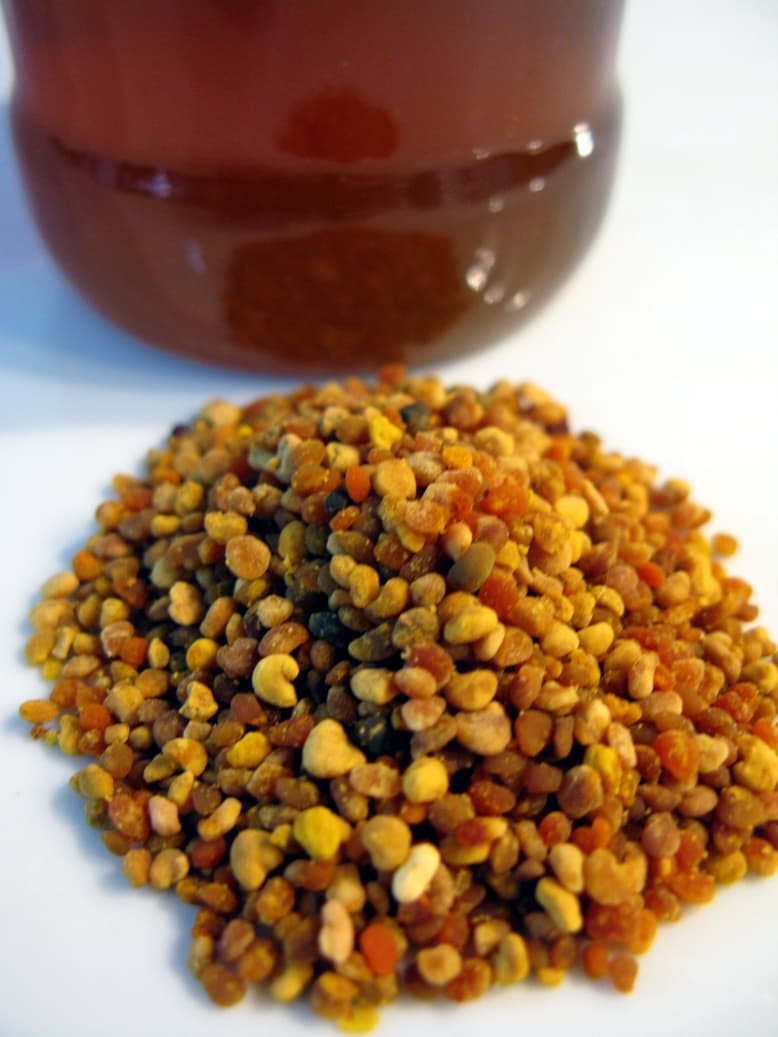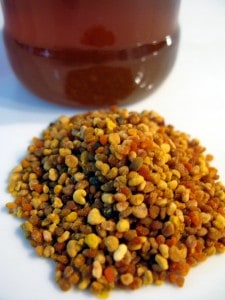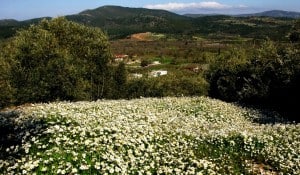Last autumn Nick came back from the village shop with a small container of what looked like popping candy, little grains of yellow, gold and ochre that smelled of dried grasses. A spirited display of mime by the shop keeper had made it clear this was something to do with honey and bees and was “cok sağlık için iyi” (very good for health) and having seen the bees staggering around the garden with their little legs weighed down by boulders of bright pollen we worked out this was bee pollen, harvested from the bees before they could take it into the hives (which seems a little mean considering we are taking the honey too!)
I was fascinated by the box of little gold nuggets so we did a little research into it and in the mean time fell over bee pollen supplements in every chemist we went to and every major supermarket in Izmir – typical!
It seems bee pollen one of those things that people either worship as a universal panacea or dismiss out of hand as quackery. Search the web and you’ll find thousands of interested parties who swear that ingesting bee pollen can cure everything from hair loss to in-growing toe nails but dig down to find scientific research and it’s thin on the ground although there are some interesting hints.
There are some scientific research articles quoted as evidence that bee pollen has effects on a variety of medical conditions, frequently mentioned is a study from 1948 by the Department of Agriculture in the USA who published the article “Delay in Appearance of Palpable Mammary Tumors in C3H Mice Following the Ingestion of Pollenized Food”. The article contained details of a study led by Dr. William Robinson of the US Bureau of Entomology where bee pollen appeared to delay the onset of tumours in mice genetically bred to definitely develop them.Also frequently mentioned is a small sample study by Dr Peter Hernuss of the University of Vienna who gave bee pollen supplements to 25 women with inoperable uterine cancer and noted they suffered less during chemotherapy, fought infection better and developed a higher concentration of cancer fighting immune system cells. I can’t find that actual study though, only mentions of it. Which seems odd because honestly researchers should be all over this doing systematic research if the reports are true.
Whilst scientific data may be thin on the ground anecdotal evidence arrives by the skip load, everything from diabetes to arthritis to depression, all seem to provide people willing to stand up and be named and say “this made me better.”
The bee pollen we buy from the old man outside the village shop and from the rickety stands that pop up outside the market gardens in the valley is different from the commercially packaged and hermetically sealed bee pollen available in the shops. For one it is obviously really fresh and I think if there is a real health benefit to be found then it will be in the really fresh pollen, it is also a helluva lot cheaper and it hasn’t been processed in any way. Heat bee pollen and you lose the value, destroying some of the unique enzymes in it, leave it in a box and you lose more of the nutritional value, so buy it at source, use it soon and use it raw.
We sent some to a friend with early stage prostate cancer, it might not cure him but in the first days of diagnosis a proactive approach is important and the bee pollen made him feel he was doing something himself to fight his disease. He takes his bee pollen raw every day sprinkled on his morning yoghurt.
When I remember – and I’m hopeless at remembering to take any type of supplement – I take a teaspoon full, it tastes different every month, last autumn it tasted of dried grasses, of the sun blasted long days of summer and fields of gold, now it tastes of spring, of delicate flowers in bright green grass and the heady whiff of cherry blossom. Scientifically it may not be the answer but it does cheer your soul.
Warning – from what I can see, if you suffer from allergies to pollen or bees then taking bee pollen as a supplement would be a bad idea. On the basis that bee pollen is entirely dependent on the flowers the bees had access to and doesn’t come labelled it could trigger an anaphylactic reaction so I’d steer clear of scoffing of random bee pollen if you are prone to severe hayfever.




Very interesting, I always believe that for whatever the ailment, mother nature has the cure if we look hard enough. x
I know people do swear by it. I haven’t looked for any and as I’m feeling rather well at the moment, I don’t feel the need to hunt it out, but you never know! It does look wonderful and your description makes me feel that if I don’t find it, I shall be missing out. We have a little herbalist in the town – I shall pop in there and see if they have some. I don’t know anyone who keeps bees ….yet. Maybe we will have a hive when we eventually settle in our new house.
Axxx
Very cool! Interesting though bc I’ve always heard that eating local honey helps “cure” seasonal allergies. I don’t have hayfever…just the itchy eyes, sneezing and such every spring and fall.
I’ve never tried it, but I like the idea of it tasting of the seasons. When the beekeeper comes back to put his hives on our land, I’ll procure some and give it a go.
Thank you for posting this Nick. While we work with a Turkish partner we have never been told about Bee Pollen. My partner Gill is is Istanbul at the beginning of May with a client and we will have to see if our DMC partner can find some Bee Pollen for us.
There was a typing ewrror in my email Nick so I ahve added this comment – email now correct.
Very interesting Karen, I will have a try locally, but I guess the local pollen will taste more of petrol and diesel, but Hey Ho!. Keep up the good work.